Weekend at Bernie's 2
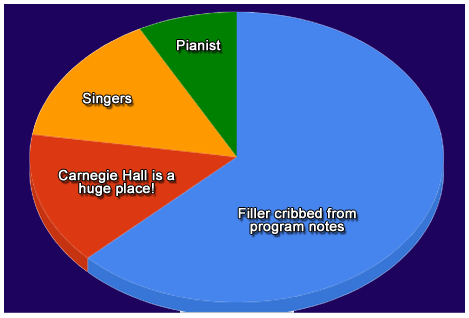


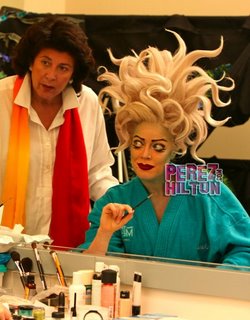 "Directed by Francesca Zambello, this Little Mermaid burdens its performers with ungainly guess-what-I-am costumes (by Tatiana Noginova) and a distracting set (by George Tsypin) awash in pastels gone sour and unidentifiable giant tchotchkes that suggest a Luau Lounge whipped up by an acid-head heiress in the 1960s. The whole enterprise is soaked in that sparkly garishness that only a very young child — or possibly a tackiness-worshiping drag queen — might find pretty.
"Directed by Francesca Zambello, this Little Mermaid burdens its performers with ungainly guess-what-I-am costumes (by Tatiana Noginova) and a distracting set (by George Tsypin) awash in pastels gone sour and unidentifiable giant tchotchkes that suggest a Luau Lounge whipped up by an acid-head heiress in the 1960s. The whole enterprise is soaked in that sparkly garishness that only a very young child — or possibly a tackiness-worshiping drag queen — might find pretty.Labels: 2008, 2009, la cieca ci guarda la cieca ci vede, nyco, nyt
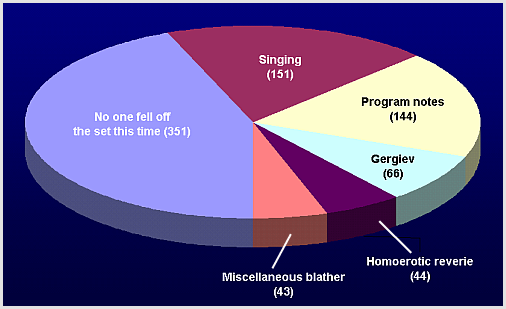
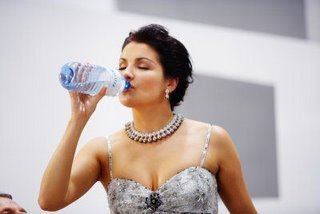 "... Netrebko is the larger presence. She has an earthiness and impishness — a daredeviltry — that may prevent her from ever attaining the kind of rarefied, disembodied sainthood that has been awarded, for example, to the American sopranos Renée Fleming and Dawn Upshaw but that also makes her more fun to watch." Charles McGrath writes a gazillion words or so about "A New Kind of Diva" in this weekend's Sunday Times magazine.
"... Netrebko is the larger presence. She has an earthiness and impishness — a daredeviltry — that may prevent her from ever attaining the kind of rarefied, disembodied sainthood that has been awarded, for example, to the American sopranos Renée Fleming and Dawn Upshaw but that also makes her more fun to watch." Charles McGrath writes a gazillion words or so about "A New Kind of Diva" in this weekend's Sunday Times magazine.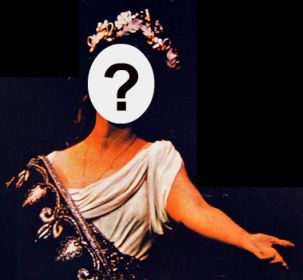 La Cieca was just wondering about something yesterday on opera-l, and doggone if Anne Midgette wasn't wondering about the same thing today in the New York Times. (That woman haunts my dreams, I tell you. It's like she's inside my head. Now, where was I? Oh, yes...) The point that dear Anne and I (among others) have mulling is this:
La Cieca was just wondering about something yesterday on opera-l, and doggone if Anne Midgette wasn't wondering about the same thing today in the New York Times. (That woman haunts my dreams, I tell you. It's like she's inside my head. Now, where was I? Oh, yes...) The point that dear Anne and I (among others) have mulling is this:The opera was chosen by Fräu Lehmann for her benefit, and from a financial point of view her selection was a very wise one . . . . From an artistic point of view the choice does not seem to be so commendable. There is no artistic reason why Lilli Lehmann should present herself to the New York public as a colorature singer. She may have been actuated by a not unnatural desire to display her versatility, but to get up a performance of Bellini's "Norma" for her benefit savors rather of self-esteem than of a strong devotion to honest art . . . . She demonstrated that her voice possessed far more flexibility and that she had a greater command of the pure ornamentation of signing that anyone suspected ... It must be said, however, that Fräu Lehmann took many of the elaborate ornamental passages at a very moderate tempo and sang them with very evident labor, thus depriving them of much of that brilliancy which the smooth, mellow, pliable Italian voices impart to them. Fiorituri without brilliancy have no "raison d' étre," and no Italian diva of standing would have received half the applause that Fräu Lehmann did for singing these passages as she did. The audience was excited by astonishment at the fact that she could do it at all.Well, that was a longer pullquote than La Cieca originally intended to use, but, goodness, that is such excellent critical writing, isn't it? Anyway, back to the argument. Lehmann, Rosa Ponselle, Gina Cigna, Zinka Milanov and of course Maria Callas were all big established stars when they took on Norma at the Met. So were Joan Sutherland and Montserrat Caballé. If Shirley Verrett, Renata Scotto and Jane Eaglen received mixed reviews for their Met performances of the opera, it wasn't because of lack of star power or clout -- they were all extremely important names on the Met roster at the time of their casting.
Labels: bel canto, caballe, critic, fleming, met, midgette, nyt, scotto, voigt
Verdi has a way of testing his singers at the opening curtain. (See also "La Traviata," Act I, Scene 1.)
The approach is not, in the abstract, without merit, Beckmesser having always seemed a proto-Jew to Wagner, awaiting modern redemption; the opera’s end comes across as the screed it always seemed.La Cieca leaves it to her cher public to debate whatever ideas might be teased from this morass of weak passive voice; she'll get the ball rolling by asking, "What exactly is a 'proto-Jew' and what qualities of the character of Beckmesser would tend to make him "seem" proto-Jewish?"
Labels: cher public, nyt, wagner
Labels: daniels, diva, gelb, la cieca ci guarda la cieca ci vede, met, nyt, ruth ann swenson, sad
Labels: blog, camp, critic, diva, drag, filth, fleming, gay gay gay gay gay, gcn, la cieca ci guarda la cieca ci vede, maury d'annato, met, midgette, nyco, nyt, our own, parody, podcast, review, voigt, youtube
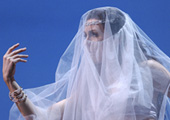 La Cieca has just been informed that soprano Mary Dunleavy will participate in tonight's panel discussion "Opera and Technology" at The Italian Academy for Advanced Studies in America at Columbia University. No word on whether La Dunleavy replaces or supplements the previously announced Lucy Shelton. Our own JJ will be there of course, along with a veritable constellation of opera pundits: Elena Park, Editorial and Creative Content, The Metropolitan Opera; Beth Greenberg, stage director, New York City Opera; Wayne Koestenbaum, poet and writer; and Anne Midgette, critic, The New York Times. That's tonight at 7:30 PM, 1161 Amsterdam Avenue (between 116th and 118th Streets), second floor.
La Cieca has just been informed that soprano Mary Dunleavy will participate in tonight's panel discussion "Opera and Technology" at The Italian Academy for Advanced Studies in America at Columbia University. No word on whether La Dunleavy replaces or supplements the previously announced Lucy Shelton. Our own JJ will be there of course, along with a veritable constellation of opera pundits: Elena Park, Editorial and Creative Content, The Metropolitan Opera; Beth Greenberg, stage director, New York City Opera; Wayne Koestenbaum, poet and writer; and Anne Midgette, critic, The New York Times. That's tonight at 7:30 PM, 1161 Amsterdam Avenue (between 116th and 118th Streets), second floor.Labels: 2008, blog, camp, critic, diva, filth, gay, jj, met, midgette, nyco, nyt, our own, podcast, youtube
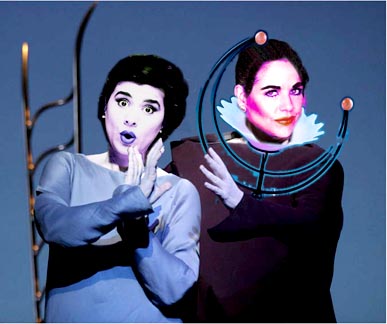
UPDATE: The role of Adalgisa in the Fleming/Wilson Norma scheduled for 2011 will not, as La Cieca puckishly suggested, be sung by Cecilia Bartoli. In fact she has just been informed by one of her most impeccable sources that the part will go to Elīna Garanča.And in other exclusive Decca recording artist/avant-garde legend related news, the Schwartz gallery at the Met is awaiting installation of a Robert Wilson "video portrait" of La Fleming. La Cieca will inform you when the Wilson film makes it on to YouTube.
Labels: 2011, fleming, la cieca ci guarda la cieca ci vede, met, nyt, youtube
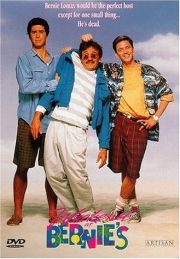 A quarter of a century elapses between the prologue and first act of Verdi's Simon Boccanegra. By a bizarre coincidence, that's exactly the same length of time since Bernard Holland has had anything remotely relevant or intelligent to say in print. His latest "efforts" are in today's NY Times, but I'm not going to bother to link. After all, La Cieca is pretty sure that you all know the plot outlines of Simon Boccanegra and The Grapes of Wrath. Even though Holland was supposed to review actual live performances of these two operas (the latter a world premiere), he didn't quite get around to writing anything you might call a "critique." Instead, he cribbed a few lines from Cliff's Notes, then slumped back into his usual banana-eared stupor.
A quarter of a century elapses between the prologue and first act of Verdi's Simon Boccanegra. By a bizarre coincidence, that's exactly the same length of time since Bernard Holland has had anything remotely relevant or intelligent to say in print. His latest "efforts" are in today's NY Times, but I'm not going to bother to link. After all, La Cieca is pretty sure that you all know the plot outlines of Simon Boccanegra and The Grapes of Wrath. Even though Holland was supposed to review actual live performances of these two operas (the latter a world premiere), he didn't quite get around to writing anything you might call a "critique." Instead, he cribbed a few lines from Cliff's Notes, then slumped back into his usual banana-eared stupor.